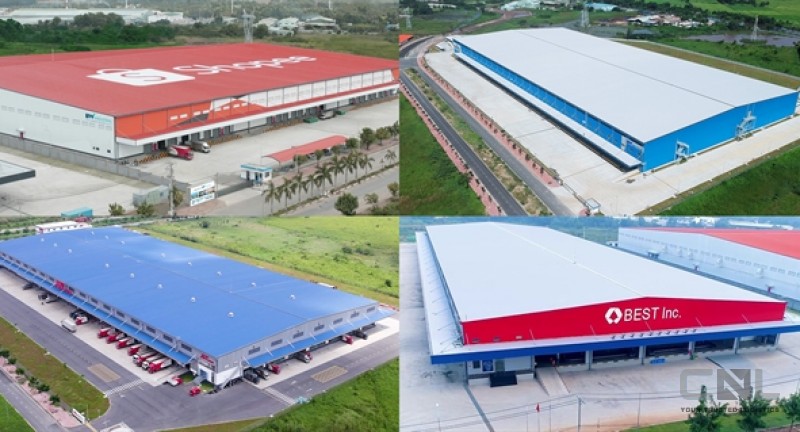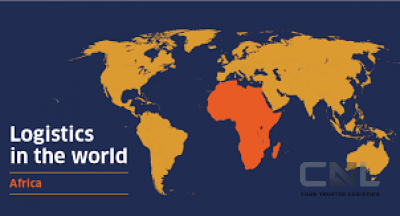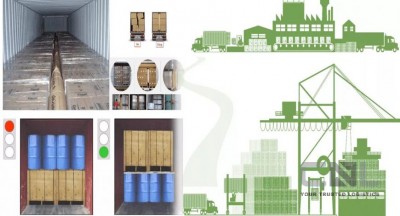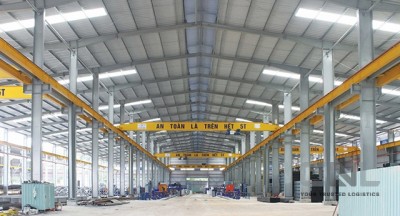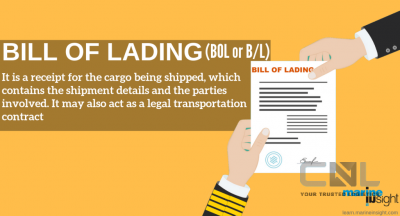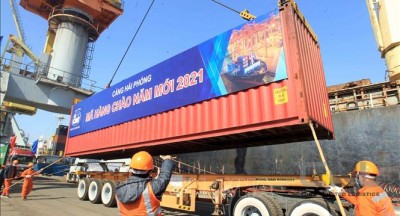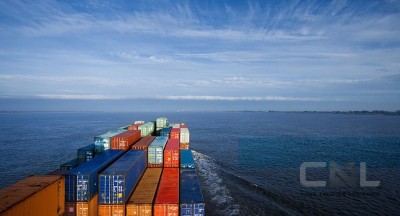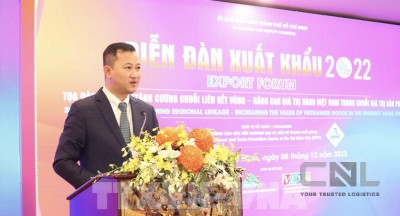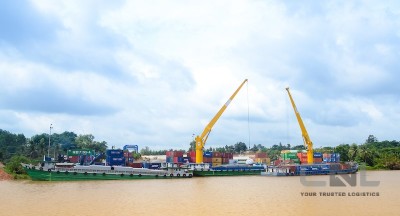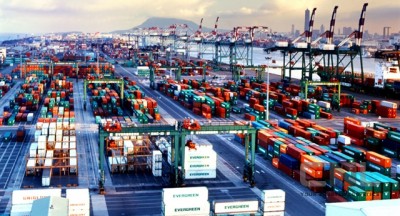Việt Nam needs solutions to develop green logistics to take advantage of free trade agreements (FTAs), especially new generation FTAs to help the industry develop, support market expansion and promote exports.

BW's e-commerce logistics centre at Tân PhúTrung Industrial Park in HCM City. Logistics firms have actively implemented digital and green transformation to adapt to new development conditions. Photo courtesy of the organiser
Vũ Hoa
HẢI PHÒNG Việt Nam needs solutions to develop green logistics to take advantage of free trade agreements (FTAs), especially new-generation FTAs to help the industry develop, support market expansion and promote exports.
This information was provided at the Việt Nam Logistics Forum 2022: Green Logistics, held by the Ministry of Industry and Trade (MoIT), Hải Phòng People’s Committee and BW Industrial Development Joint Stock Company in the northern port city on Saturday.
Speaking at the event, Minister of Industry and Trade Nguyễn Hồng Diên said Việt Nam is located in a dynamic development area of the world where the flow of goods is concentrated and exchanges are strong. In addition, the economy has a large openness while import-export and e-commerce have always grown at a double rate. According to the figures, Việt Nam is considered a market with great potential for developing logistics services.
The Party and State have promulgated many mechanisms, policies and directed solutions to remove difficulties, reduce costs and improve competitiveness, creating a favourable environment for the development of the logistics service industry.
“With the Government’s attention and drastic direction, especially the all-out efforts of the business community, Việt Nam's logistics service industry has made remarkable progress, maintaining double-digit growth, gradually affirming its brand and position in the region and the world,” Diên said.
In addition, logistics firms have made efforts to transform operation methods, increase investment in equipment, focus on training and development of human resources. They have also actively implemented digital and green transformation to adapt to new development conditions, meeting the increasing demands and standards of customers in the use of environmentally friendly services.
However, at the event, economic experts also said that, despite achieving remarkable results, the logistics industry also revealed limitations and weaknesses as its development has not been equal to its potential. Meanwhile, the sector has seen high costs, limited competitiveness and weak links with export industries, as well as a lack of high-quality human resources.
Prime Minister Phạm Minh Chính at COP 26 made commitments to the international community to economical and efficient use of energy and emissions reduction. Therefore, in the coming years, green logistics would be given priority by the Government to promote energy transformation towards greening, developing an environmentally friendly logistics industry.
Head of the Party Central Committee's Economic Commission, Trần Tuấn Anh said that, in the new development context, it is required that the logistics industry have solutions to ensure the role of logistics in maintaining the supply chains of goods and services while having a different mindset and vision to catch up with the world, and demonstrate a leading role in efforts to protect the environment and reduce greenhouse gas emissions.
Anh asked the MoIT to research, develop and submit the strategy for the development of Việt Nam's logistics industry to 2030, with a vision to 2045, ensuring to meet the development requirements in the new context and situation.
In which, the strategy should focus on green logistics development orientation and environmentally friendly solutions; completing institutions, policies and laws on logistics services, multimodal transport, and cross-border transport to create a favourable legal basis for logistics operations and green logistics development in Việt Nam.
“Especially, the strategy should pay attention to implementing digital transformation, green transformation in the logistics industry; consider this both a requirement and a driving force for innovation and sustainable development of the industry. The sector should continue to promote international association and cooperation activities, especially in the field of training, sharing of experience in developing green logistics, digital logistics, and e-commerce logistics to improve capacity, adaptability, competitiveness and mastery of some value chains of Vietnamese enterprises in this field,” Anh added.
Trần Lưu Quang, Secretary of the Hải Phòng’s Party Committee, has outlined some solutions to promote the development of logistics services such as promoting administrative reform, digital transformation in the field of seaports and logistics; increase investment attraction, trade promotion, form specialised logistics service chains with high added value and regional linkages. The country should also build centralised and large-scale logistics zones associated with the system of seaports, industrial parks, and economic zones with synchronous, modern and smart infrastructure.
Cost optimisation with logistics hubs
According to the Việt Nam Logistics Association (VLA), the outstanding growth rate of e-commerce in recent years has led to fierce competition between logistics service providers of Việt Nam and the world, along with the emergence of advanced forms of logistics services.
The VLA said in 2021, logistics costs still accounted for about 16.8 per cent of the value of Vietnamese goods, while this cost around the world is currently only about 10.6 per cent. High logistics costs not only consume national resources, raising production costs and commodity prices, but also make it difficult for businesses to compete in the market.
“The outstanding growth of e-commerce in recent years has contributed to promoting the development of logistics systems for e-commerce, including logistics hubs. Logistics hubs not only contribute to increasing efficiency in logistics activities but also help businesses improve competitiveness,” said Vũ Đức Thịnh, General Director of Lazada Logistics Vietnam.
In addition, the discussion also mentioned the role and development trend of urban logistics hubs, in the context of e-commerce development coupled with the demand for last-mile delivery logistics. The high pace of urbanisation and the rapid rise of the middle class offer more opportunities to promote the e-commerce industry in Việt Nam than in other economies in Southeast Asia. This will be a condition to promote the formation of logistics hubs in urban areas, especially Hà Nội and HCM City.
Fion Ng, Chief Operation Officer of BW Industrial Development Joint Stock Company, said: "As the largest industrial real estate and logistics platform for lease in Việt Nam, we find that locations large enough and suitable for building logistics hubs are very scarce. About BW, we have made constant efforts to be able to find positions with strategic advantages. For example, in the Northeast of HCM City, we have built logistics hubs to serve the delivery of Shopee and J&T Express. Goods will be transported to these transshipment warehouses and then continued by smaller trucks into urban areas for last-mile delivery to consumers. The emergence of these logistics hubs has helped to optimise the transportation network for delivery to the end consumer and we are also considering building specialised logistics hubs to meet the demand for Fast Moving Consumer Goods (FMCG) or pharmaceutical products.” VNS
vietnamnews.vn
